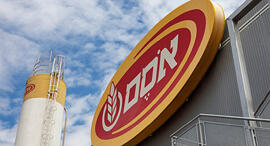Getting your Trinity Audio player ready...
Food manufacturer and distributor Osem announced on Tuesday it was postponing a price hike planned for its products by three months following nationwide furor and pressure from the Finance Ministry.
According to the company, it will use the coming months to "examine sundry ways to mitigate the rise in prices of consumer products in Israel" and will reconsider whether to raise prices again after Passover.
3 View gallery


Osem logo hanging outside one of the food giant's distribution centers in central Israel
(Photo: Calcalist)
The announcement came at the end of a meeting between Osem Group Chairman Dan Propper and Finance Minister Avigdor Liberman in which the food giant's chief presented the reasons that led the company to raise its price increases.
Three years ago, the company walked back on a similar 4.5% price hike on its products under similar circumstances after talks with then-finance minister Moshe Kahlon.
Osem's decision was anteceded by a loud online campaign calling to boycott the company's products and urging consumers to switch to buying from cheaper competitors in protest of imminent price increases.
Eliyahu Zohar, mayor of the southern city of Kiryat Malachi, said the municipality would no longer use taxpayer money to purchase goods from Osem.
Liberman and Economy and Industry Minister Orna Barbivai on Sunday fired off an irate letter to sundry food importers and manufacturers, including Osem, assailing them over rising prices of foodstuffs.
"Your announcement of price increases at this time is cynical and hurts the citizens of the country," the letter read.
The indignant ministers also stated they "will not hesitate to take the necessary steps to ensure a competitive and fair economy" but did not specify which measures they were referring to.
Liberman and Barbivai urged the letter's addressees to "stop price increases as part of the national responsibility expected from the companies in this challenging period while taking into account their economic situation and profits."
3 View gallery


Economy and Industry Minister Orna Barbivai and Finance Minister Avigdor Liberman
(Photo: Alex Kolomoisky and Hadar Yoavian)
They also noted that the shekel has strengthened significantly against other currencies around the world in a low inflationary environment by 2021, meaning costs of products imported to Israel by the companies have significantly declined while prices for most foodstuffs remained among the highest in the world.
Israel has been seeing substantial price hikes across the board, with food, gas and electricity prices all experiencing upward pressure.


